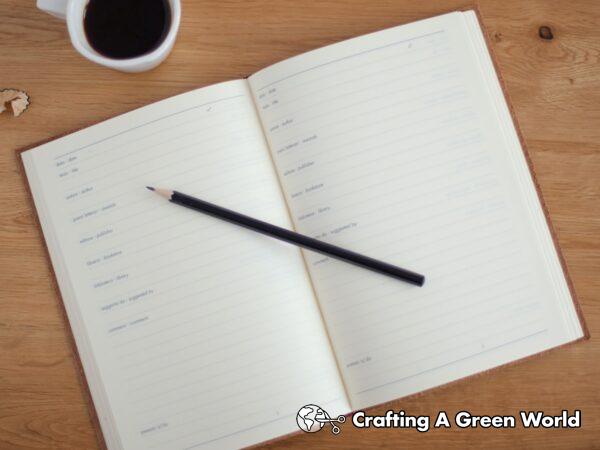Cultivating a heart of forgiveness is a journey of introspection that can uplift your spirit and calm your mind. Through journaling, you can process emotions, clear grudges, and create a pathway to healing and peace.
In this article, we’ll provide a number of forgiveness journal prompts to help fuel your writing voyage. Whether you’re seeking reconciliation, personal growth, or simply a deeper understanding of your own feelings, these prompts will guide your exploration.
So, grab your journal, find a serene sanctuary, and let’s embark together on this meaningful journey. 🕊️
Understanding Self-forgiveness
Understanding Self-Forgiveness through journaling prompts aids in letting ourselves off the hook, ensuring peace and mental balance. Here are 20 prompts to assist you in harnessing self-forgiveness:
- Describe a time when you found it challenging to forgive yourself. What was the situation?
- Write about an instance in which you were able to forgive yourself, and explain how it changed you.
- Imagine a conversation with your younger self. What forgiveness would you ask for?
- Reflect on a mistake for which you have not yet forgiven yourself. What steps can you take to forgive yourself?
- Jot down three positive affirmations to help you with self-forgiveness.
- Recall a situation where you hurt someone unintentionally. Write a letter forgiving yourself for this.
- Identify one aspect of your character you've struggled to accept. Ponder how forgiving yourself for this trait can improve your self-acceptance.
- List five acts of kindness you can do for yourself as a form of self-forgiveness.
- Narrate a time when you held a grudge against yourself. How did it affect you?
- Scribe about how your life would change if you forgave yourself more frequently.
- Describe how does the weight of not forgiving yourself feels like. How would you wish for it to be?
- Think of a regret you have. Write about how forgiving yourself for it could change your perspective.
- Assess three ways in which not forgiving yourself in the past has held you back.
- Envision a future where you are completely forgiving of yourself. What does it look like?
- Write an apology letter to yourself for the times when you didn't exercise self-forgiveness.
- Chronicle a time when you felt guilty for something out of your control. How can self-forgiveness help in such situations?
- List three things you learned about yourself when you practiced self-forgiveness.
- Ponder over a mistake that aided your personal growth. Write about it from a self-forgiving perspective.
- Write a letter of forgiveness to yourself for an old memory that still causes you distress.
- Contemplate on five things you would tell someone who is struggling with self-forgiveness.
Healing From Past Mistakes
Healing from past mistakes through forgiveness journaling is an empowering process where we acknowledge, accept and forgive our past wrongdoings, making room for growth and self-improvement. Here are 20 engaging writing prompts to aid you on your journey to healing:
- Detail a past mistake you're struggling to forgive yourself for.
- Write about the emotions you felt immediately after making the mistake.
- Describe how this mistake has affected your life.
- List down the lessons you’ve learned from this mistake.
- Imagine your life if the mistake never occurred. Write about the differences and similarities.
- Write a letter of apology to your past self for the mistake you've made.
- Discuss what you would do differently if you could go back to the moment before your past mistake.
- Write about a person who was affected by your mistake and how you felt about it.
- Analyze how this mistake has contributed to your personal growth.
- Visualize forgiveness for your mistake and describe how it may feel.
- Write about the steps you've taken to rectify this mistake.
- Describe an instance where you successfully avoided making the same mistake again.
- Write a letter of forgiveness to yourself for this mistake.
- Elaborate on how you'll ensure not to repeat this mistake in the future.
- Reflect on how forgiving yourself has improved your emotional well-being.
- Compare your current feelings towards the mistake with your feelings at the time it occurred.
- Write an entry as if you're mentoring someone who just made a similar mistake. What advice would you give?
- Detail what forgiving yourself for past mistakes means to you.
- Discuss any fears or apprehensions you have about repeating the same mistake.
- Finally, write a positive affirmation asserting your capability to make better choices.
Forgiving Others And Letting Go
Forgiveness towards others and letting go through journaling allows us to release negative emotions and harbor feelings of peace, promoting emotional well-being. Here are 20 journal prompts to guide you through the journey of forgiveness and letting go:
- Write about a time you forgave someone. How did it make you feel afterward?
- Detail a memory where you struggled to forgive someone. What emotions are still attached to this memory?
- Outline an incident where someone forgave you. How did their forgiveness impact you?
- List three ways you can practice forgiveness in your daily life.
- Write a letter to someone you want to forgive but haven't yet. What would you like to say to them?
- Describe what forgiveness means to you.
- Draft a forgiveness affirmation to recite during your daily routine.
- Recall a moment where you forgave someone easily. Why do you think it was easier in this case?
- How would your life change if you forgave every resentment you currently hold?
- Write about a moment you found it difficult to let go of a personal grievance. How can you approach this differently now?
- Detail a situation where you felt someone didn't deserve your forgiveness. What are your feelings towards this situation now?
- List some positive results of letting go and moving on from difficult situations.
- Visualize someone who wronged you. Write a dialogue where you forgive them.
- Recall a time when you let go of a grudge or resentment. How has this decision improved your life?
- Imagine forgiving all your resentments. How would your life look?
- Write a letter of forgiveness to yourself for a time you disappointed yourself.
- Pen down your feelings about a past wrong done to you. Do you see this situation any differently now?
- Reflect on how harboring resentment hinders your personal growth.
- Consider a person you're holding a grudge against. Why has it been difficult to let go?
- Write about a time you found inner peace through forgiveness and letting go.
Journaling For Recovery
Journaling for Recovery emphasizes the therapeutic power of writing to process feelings, emotions, and self-wounds, particularly in the journey towards forgiveness. Here are 20 prompts to help guide you in your recovery journaling journey:
- Describe a moment where you felt hurt. What emotions does this memory spark?
- Write a letter to your past self, acknowledging the wrongs and forgiving yourself.
- Reflect on a situation where you feel you wronged someone else. How can you seek their forgiveness?
- List three things you would like to forgive yourself for.
- Visualize a future where you have found self-forgiveness. What does it look like?
- Acknowledge a time you felt deeply misunderstood. Write about your feelings and thoughts during this time.
- Outline ways in which you can demonstrate forgiveness towards others.
- Write a forgiveness affirmation for yourself, and explain why it resonates with you.
- Reflect on a time when you showed forgiveness to someone who hurt you. How did it impact you?
- List the barriers you feel are preventing you from forgiving yourself or others.
- Write about an experience where you were unable to forgive. What would you do differently now?
- Describe a place or situation where you feel most at peace. How can you incorporate more of this into your life?
- Explore the link between forgiveness and healing in your own journey.
- Write about a person you have forgiven. How has your relationship with them changed?
- Describe a situation where you forgave someone prematurely. How did it affect you?
- Dismantle a past negative experience by writing about it from a perspective of growth and learning.
- Consider an instance where self-forgiveness was challenging. How did you eventually move towards it?
- Write a heartfelt apology to someone you feel you've wronged, even if you don't send it.
- Reflect on a situation where forgiving someone brought you peace.
- Provide advice to someone who is struggling with forgiveness. What lessons from your journey can you share?
Rebuilding Trust After Betrayal
Rebuilding trust after a betrayal is a crucial part of the forgiveness process, and journal prompts can help guide reflections and actions towards this important goal. Here are 20 prompts to help foster trust rebuilding:
- Describe a moment of betrayal you experienced. How did it change your perspective on trust?
- Think of a specific action the person who betrayed you could take to begin rebuilding trust.
- How have you handled feelings of anger or resentment towards the person who betrayed you?
- Write a letter to the person who betrayed you expressing your feelings, whether or not you plan to send it.
- Describe how your relationship with the person who betrayed you could look after the trust has been rebuilt.
- What would need to occur for you to feel secure in the relationship again?
- Visualize a time in the future when trust has been restored. What does that look like?
- How would you act differently in the relationship if trust were to be restored?
- What steps can you take to rebuild your self-esteem after being betrayed?
- Describe a kind gesture that the person who betrayed you could do that would help mend the relationship.
- What are some ways you can redevelop trust in your own judgment following a betrayal?
- Write down three affirmations that might help you through the journey of rebuilding trust.
- How would you explain the betrayal to a third party who wasn't involved?
- What would it mean for you to forgive the person who betrayed you?
- List any lingering questions you have for the person who betrayed you.
- What is the most difficult part of rebuilding trust for you?
- How would you know if you have let go of the past betrayal?
- Think of any obstacles that could prevent trust rebuilding. How could you overcome them?
- Describe a situation where someone else regained your trust after a betrayal. What made that possible?
- Reflect on what you have learned about yourself from the experience of betrayal and the process of rebuilding trust.
Learning Empathy Through Forgiveness
Learning Empathy through Forgiveness encourages us to step into another person's shoes, accepting and understanding their actions, which opens the door to forgiveness. Below are 20 prompts to help build empathy and forgive others through journaling:
- Write about a time when you forgave someone. How did it change your relationship with them?
- Describe an instance where you found it hard to forgive someone. What emotions did you feel?
- Think about a person whom you need to forgive. Write about their perspective to understand their actions.
- List three ways showing forgiveness has brought you peace.
- Journal about a time when someone forgave you. How did their forgiveness make you feel?
- Describe three situations where not forgiving someone negatively affected your life.
- Write a letter to someone you are struggling to forgive. Imagine how they felt in the moment, to help build empathy.
- Reflect on a quote or piece of advice about forgiveness that has resonated with you. Why did it strike a chord?
- Recall a story, movie, or song about forgiveness that touched you. Write about the emotions it evoked.
- Portray a time when you forgave yourself. How did empathy play a crucial role in this process?
- Identify a societal or global issue you find hard to forgive. Now, write about the circumstances that could have led to it.
- Imagine forgiving a person who hurt you deeply. How would this act affect your emotional wellbeing?
- Write about the role empathy plays in the act of forgiveness.
- List three benefits of practicing empathy and forgiveness towards people around you.
- Narrate a situation where you forgave someone even without receiving an apology. Did empathy help facilitate this forgiveness?
- Think of a childhood incident where forgiveness played a key role. Write about the lessons it taught you.
- Describe a situation where you practiced empathy to forgive a stranger. How did this experience feel?
- Reflect on a conflict you had with a loved one. Write a forgiveness plan detailing how empathy could resolve the issue.
- Write an apology letter to your past self for any mistakes you need to forgive yourself for. Explain the understanding you now have of the situation.
- List five ways you can remind yourself to be more forgiving and empathetic every day.
Moving On From Negative Experiences
Moving on from negative experiences via journaling with a focus on forgiveness is a powerful way to heal from past hurts and trauma. Here are 20 writing prompts to guide you on this journey of self-forgiveness and resilience:
- Write down a negative experience that you're ready to forgive and let go. Why is it difficult?
- Pour your emotions regarding this negative incident on the paper. What feelings arise as you write?
- Describe the impact this negativity has had on your life. How has it shaped you, whether positively or negatively?
- Write a letter to yourself at the time of the negative experience, offering comfort and understanding.
- List five lessons you learned from this negative experience and how they have made you a better person.
- Describe what forgiveness means to you in the context of this experience.
- Write about your guilt and regrets related to this incident. Reflect on the reasons you hold onto guilt and how it affects your capacity to forgive.
- Visualize a future without this negative experience hanging over you. What does that future look like?
- Reflect on your fears related to releasing this negative experience. What do you fear might happen if you forgave?
- Write a letter from your future self, thanking you for having forgiven and moved on.
- Describe the person or situation you're struggling to forgive. Write about why forgiveness may bring you peace.
- Imagine a conversation with the person who hurt you. What do you wish you could say to them?
- Write about forgiveness as a journey, not a destination. What steps have you taken so far, and what's next?
- Pen down some affirmations or quotes about forgiveness that resonate with you.
- Write about how holding onto a grudge has impacted your health and daily life.
- Reflect on the positive aspects of your life that you may have overlooked due to this negative experience. What are they?
- Identify three self-care activities that could facilitate your forgiveness process.
- Write a letter to the person who hurt you, expressing your decision to forgive. (This letter isn't meant to be sent)
- Think about what closure looks like for you. What would you need for your healing process to feel complete?
- Finally, forgive yourself for the time it has taken to forgive. Understand that forgiveness is a personal journey that happens on its own timeline.
Exploring Regret And Reconciliation
Exploring regret and reconciliation through journaling fosters self-awareness, enabling a deeper understanding and acceptance of past mistakes, and paving the way for inner peace and healing. Here are 20 prompts to guide you in this introspective journey:
- Recount an instance where you felt intense regret. What can you learn from it?
- Describe a time when you hurt someone, knowingly or unknowingly. If given a chance, what would you do differently?
- Write an apology letter to someone whom you've wronged in the past but never offered an apology.
- Record a time when you forgave someone who hurt you. How did it change your relationship with that person?
- List three instances when someone apologized to you. How did it make you feel?
- Envision a conversation with someone you hurt but can't reconcile with. What would you say?
- Write about a regret that still haunts you. What steps can you take to forgive yourself?
- Describe a situation where you were unable to apologize. What stopped you then and what can you do now to rectify the situation?
- Think about an unresolved conflict. Draft a plan on how you can initiate reconciliation.
- Reflect on any personal barriers hindering your ability to reconcile. How can you conquer them?
- Write about one instance where forgiving someone brought you peace of mind.
- Record a moment of self-forgiveness and its effect on your mental health.
- Describe a mature act of reconciliation that had a profound impact on you. Why was it impactful?
- Write about a negative experience that you need to let go. How can you move towards forgiveness?
- Reflect on the potential growth that regret and reconciliation can offer.
- Write about the benefits you have experienced from making amends.
- List three actions you can take to mend a fractured relationship.
- Write about something you regret not doing. How do you forgive yourself?
- Explore in writing the feeling of freedom that accompanies forgiveness and reconciliation.
- Reflect on your journey of exploring regret and reconciliation so far. What are your key takeaways?
Gaining Perspective On Painful Situations
Gaining Perspective on Painful Situations through forgiveness journal prompts aids in understanding and making sense of past hurts, ultimately leading to healing and closure. Here are 20 writing prompts designed to help you navigate through this process:
- Describe a hurtful event in your life. How does it still affect you today?
- What emotions arise when you think of this painful situation? Write them down and explore each one.
- Have you acknowledged your pain and allowed yourself to grieve? Write about this process.
- What does forgiveness mean to you in the context of this situation?
- How might forgiving the person who hurt you change your current emotional state?
- Write a letter to the person who caused you pain. You don't need to send it, just express your feelings.
- List three positive things that happened in your life as a result of this hurtful event.
- Write about the lessons you have learned from this painful experience.
- How might your life be different had this event not occurred?
- Reflect on how this painful situation has shaped your character and personal growth.
- If you could go back in time, what would you tell your past self before the painful incident happened?
- Write about the person who hurt you from a neutral—or even sympathetic—point of view.
- List five steps you can take towards forgiving and healing.
- Write about what life would look like if you were free from this pain.
- Imagine a future event where you might cross paths with the person who hurt you. How would you behave?
- Are there any perspectives or beliefs that prevent you from forgiving? Explore them in detail.
- Do you see any recurring patterns in situations that cause you pain? If yes, how can you break them?
- Write about what true forgiveness feels like to you.
- Are there any unresolved feelings about this situation? Write them down with no judgement.
- Write a letter to yourself, extending the kindness, understanding, and forgiveness you need.
Building Relationships Through Forgiveness
Journaling about forgiveness allows us to let go of grudges, regain peace, and foster healthier relationships with those around us. Below are 20 writing prompts that can guide you in developing relationships through forgiveness.
- Write about a time when you forgave someone. How did it influence your relationship with them?
- Reflect on an instance where you struggled to forgive someone. What was holding you back?
- Write a letter of forgiveness to a person you struggle with but don’t send it.
- List three reasons why forgiveness is beneficial for your relationships.
- Think of a person you’ve not yet forgiven. What steps would you need to take to forgive them?
- Ponder on an occasion where you were forgiven. How did it affect your relationship with the person involved?
- Describe a relationship which improved after someone extended forgiveness to you.
- Imagine a conversation with someone you’ve forgiven. What would you discuss?
- Draft a letter to your future self about the importance of fostering relationships through forgiveness.
- Name a situation where you regret not forgiving someone. How would things be different if you had?
- Write about how you can practice forgiveness in your daily interactions with people.
- Reflect on someone you admire for their ability to forgive. What are their qualities that you would like to emulate?
- Consider a grudge you’re holding. Write about how you would feel if you let go.
- Imagine forgiving someone who hasn’t asked for it. How does it feel?
- Draft a forgiveness affirmation you can say to yourself daily.
- Reflect on the hardest forgiveness obstacle you’ve faced. How did you surpass it?
- List all the emotional barriers preventing you from forgiving someone.
- Write about the benefits you’ve experienced personally after forgiving someone.
- Consider a relationship you'd like to repair. How could forgiveness help achieve this?
- Write about how the act of ongoing forgiveness can strengthen your relationships.
Unpacking Guilt And Shame
Writing about guilt and shame in your forgiveness journal allows you to dissect these feelings and foster a deeper understanding, helping to propel you towards forgiveness. Here are 20 suggestions to guide you:
- Write about a time when you felt overwhelming guilt. What triggered it?
- Describe an occasion when you felt shame. How does it impact your self-perception?
- Reflect on what guilt has taught you about yourself.
- Recall an instance where shame might have guided your actions.
- List three behaviors you engage in when you feel guilty.
- Note down the physical sensations you experience when you feel shame.
- Record a conversation you would have with guilt if it was a person.
- Write a letter to shame, expressing your feelings towards it.
- Recall a time when feeling guilty led to positive change. What happened?
- Describe an instance when suppressing guilt only made the feelings stronger.
- Analyze a long-term pattern of shame in your life. How has it influenced you?
- Write about a time when you forgave yourself for something you felt guilty about.
- Record three things you can do to cope with feelings of shame.
- Reflect on how guilt has affected your relationships with others.
- Meditate on an incident that fills you with shame. Write about it from an objective viewpoint.
- Note down guilt's purpose in your life. Is it serving you or hindering your growth?
- Record the emotional response you feel when you free yourself from a guilty feeling.
- Write about an incident that triggers feelings of shame each time you recall it.
- Think about a burden of guilt you're ready to release. Describe it and how you plan to let it go.
- Dedicate a page to forgiving yourself, focusing particularly on significant instances of guilt or shame.
Prompts On The Power Of Forgiveness
Exploring the power of forgiveness through carefully curated journal prompts can provide new insights and perspectives, fostering personal growth and healing. Here are 20 prompts that will guide you in your journey towards forgiveness:
- Recall an event when you found it extremely difficult to forgive someone. What made it so difficult?
- Write about an experience where you forgave someone easily. What made it different from other times?
- Think of a time you forgave yourself for a mistake. How did it impact your self-esteem and wellbeing?
- Name three actions you can take today to promote a forgiving spirit in your relationships.
- Imagine forgiving a person you've held a grudge against. How would that change your feelings towards them?
- Write a letter to someone you need to forgive. You don't have to send it – just express your feelings.
- Reflect on the physical and emotional effects holding onto anger and resentment have had on you.
- Write about an instance when someone forgave you. How did it impact your relationship with that person?
- Identify a personal situation where you struggle with forgiveness. What steps can you take towards healing?
- Compose a forgiveness mantra or affirmation that resonates with you.
- Inquire within yourself – is there something you have yet to forgive yourself for? Write about it.
- How has your understanding of forgiveness changed over your lifetime?
- Jot down how your life would look if forgiveness was a guiding principle.
- Think about a famous figure who embodies forgiveness for you. How do they inspire you?
- Write a forgiveness plan – a step by step guide for your journey towards forgiveness.
- Detail the ways in which forgiveness is a form of self-care and love.
- Write about the connection between forgiveness and freedom.
- Think of a fictional character that exemplifies forgiveness well and explain why.
- List the ways forgiveness could improve your personal relationships.
- Envision the person you would become if you mastered the art of forgiveness.
Writing To Accept Apologies
Writing to Accept Apologies using forgiveness journal prompts assists in processing and acknowledging apologies, paving the way towards healing and emotional growth. Here are 20 prompts to aid in this process:
- Describe a time when you find it hard to accept an apology, what emotions did you encounter?
- State an apology you recently received, how did it make you feel?
- Write a letter embracing an apology you had a hard time accepting.
- Think of an instance where you accepted an apology but still hold resentment. Why do you think that is so?
- How would you define a sincere apology?
- Describe a time when accepting an apology made a positive change in your life.
- Write about an apology you're still waiting for. How will it help you move forward?
- Jot down three qualities of an apology that matter the most to you.
- Write about an incident where you struggled to accept an apology initially but managed to do it eventually.
- Narrate a situation where you accepted an apology but the other person did not change their behavior.
- Describe a situation where an apology was not verbal. How did you interpret it?
- How would you handle a situation if the other person never apologizes?
- Write a letter to yourself forgiving someone else, even though they haven't apologized.
- Describe how you felt after accepting an apology, did it bring peace?
- Write about an unforgivable incident, what makes it hard to accept an apology for this?
- Discuss a situation where accepting an apology helped you understand the other person better.
- List down three things you would say to prepare someone for accepting your apology.
- Write a letter to someone apologizing for not accepting their apology earlier.
- Reflect on how accepting apologies has helped with your personal growth.
- List down five reasons why it is important to accept apologies.
Granting Forgiveness To Yourself
Granting forgiveness to ourselves is an integral part of emotional well-being and personal growth. Here are 20 prompts to guide you in practicing self-forgiveness in your journaling journey:
- Reflect on a past mistake you've not yet forgiven yourself for. What feelings are still attached to it?
- Write a letter to yourself about this mistake, acknowledging your feelings and expressing understanding.
- Acknowledge three positive outcomes that resulted from a past mistake.
- Recall a situation where you treated yourself harshly. How could forgiveness make a difference?
- Describe three lessons you have learnt from a past mistake.
- Write a forgiveness statement to yourself for a time you were overly self-critical.
- Reflect on a time you didn't meet your own expectations. Write about how you can forgive yourself for that.
- Sketch out a situation where your actions may have hurt someone else, express how the event makes you feel today.
- Write about any guilt you're currently holding onto. What steps can you take to forgive yourself?
- Draft a letter to your younger self about an issue you have struggled to forgive yourself for.
- List three kind phrases you could use to comfort yourself when you feel guilty.
- Write about your understanding of self-forgiveness. What does it mean to you and why is it important?
- Recall a situation where you experienced self-forgiveness. What led you to forgiving yourself?
- Write an affirmation that helps reassure you of your worthiness of self-forgiveness.
- Reflect on a time when you felt self-compassion. How can you use this to guide self-forgiveness?
- Describe how forgiving yourself has or could improve your relationship with others.
- Think about any self-punishing behaviors you engage in. How can forgiveness change that?
- Detail a personal challenge and write about how you can forgive yourself for any perceived failures pertaining to it.
- Write a forgiving letter to yourself from the perspective of a loved one who sees your worth.
- Reflect on what you want to achieve from forgiving yourself. How will your life change with this act?
Coming To Terms With Unforgivable Acts
Coming to terms with unforgivable acts through journaling can act as a catalyst for healing and personal growth, fostering a deep sense of empathy and compassion within ourselves. Here are 20 prompts to guide your reflections on forgiveness:
- Write about an unforgivable act, from your perspective, without casting blame.
- Explore why you label this act as "unforgivable."
- Identify the emotions you felt when the act occurred and how they have evolved over time.
- Write down the impact the act had on your life and your perceptions.
- Express in detail your feelings towards the person who did the act now.
- Reflect on how carrying this lack of forgiveness impacts your daily life.
- What would your life look like if you could forgive this act?
- Explore what forgiving the perpetrator would mean for you personally.
- Visualize a scenario where you confront the perpetrator, expressing your feelings and thoughts without anger or resentment.
- Write a letter to yourself from the perspective of a compassionate friend, giving advice on how to cope with this act.
- Write down any fears or apprehensions you have about forgiving this act.
- Imagine a situation in which the person who committed this act asks for your forgiveness. How would you respond?
- Reflect on whether there's anything you can learn or gain from this experience.
- Explore how holding onto resentment might be serving you negatively.
- Document what steps you need to take to move forward and heal.
- Consider the idea that forgiveness is for you, not for them. How does this change your perspective?
- Write a letter of forgiveness to the person who did the act, even if you never send it.
- Document the steps you would have to take to forgive this act.
- Write down any misconceptions you've had about forgiveness and the truth you now know.
- Reflect on your progress toward forgiveness and describe how it feels.
Narrating Forgiveness Journeys
Exploring forgiveness journeys through journaling allows us to process past wrongs and hurts, leading us towards healing and growth. Here are 20 prompts that can help you in writing about your journey towards forgiveness:
- Write about a time where you truly forgave someone. What led you to this point?
- Describe a situation where you struggled to forgive. What was hindering your forgiveness?
- Reflect on an instance where someone asked for your forgiveness. How did their request make you feel?
- Identify three actions you can take to facilitate forgiveness towards someone in your life.
- Contemplate on someone you're finding hard to forgive. Write a letter expressing your feelings, without the intention of sending it.
- Journal about an incident where you needed to ask for someone's forgiveness. What pushed you to take this step?
- Think about a grudge you're holding onto. What steps can you take towards releasing that resentment?
- Write about an event where you didn't receive an apology but chose to forgive anyway. How did that affect you?
- Identify a negative action or event you would like to forgive yourself for.
- Journal a letter of self-forgiveness for the action or event identified previously.
- Write down a forgiveness mantra that resonates with you.
- Reflect on your journey of forgiveness so far – has it shifted your perspective in any way?
- Write about a time when an apology felt empty or insincere. How did you handle it?
- Imagine forgiving someone before you are ready to. What emotions arise with this thought?
- Journal about a situation where you've witnessed the power of forgiveness – either from media or in real life.
- Reflect on the role forgiveness plays in your life. How has it shaped who you are today?
- Write a letter to a younger version of yourself. What forgiveness lessons would you impart?
- Describe an instance where you've replaced anger or resentment with forgiveness.
- Picture forgiveness as a physical journey. Write about the steps, twists, and turns it takes to reach your destination.
- Reflect on the balance between forgiving others and prioritizing your mental well-being. In what situations can you establish boundaries while maintaining a forgiving nature?
Processing Anger And Resentment
Processing anger and resentment through journaling allows us to confront these intense emotions head-on, inviting understanding, self-awareness, and eventually leading to forgiveness. Here are 20 prompts to aid you navigate through these feelings:
- Write down an event that made you feel angry recently, and why.
- Describe a lingering resentment you have and why it has stayed with you.
- Draft a hypothetical conversation with the person who caused you anger or resentment.
- List down three emotions you feel apart from anger when you think about a specific resentment.
- Write about how your life might change if you let go of this anger.
- Describe a time when your anger or resentment might have been reasonable.
- Reflect on any feelings of shame or guilt associated with your anger or resentment.
- Write a letter to your anger; what would you like to say to it?
- Think about possible roots of your anger in your past.
- Write about a time you reacted positively despite feeling angry.
- Describe an incident where you might have misdirected your anger.
- Write about a step you could take to forgive the person causing your resentment.
- Detail how holding onto this resentment impacts your daily life.
- Describe the perfect apology from the person who upset you.
- Reflect on an angry moment you now view differently.
- Write a letter to yourself from the perspective of someone who genuinely understands and forgives you.
- Describe how you can use your experience of anger or resentment positively.
- Journal about a lesson you learned from a situation that made you angry.
- Imagine the person who caused your anger or resentment in a moment of vulnerability. How does this change your feelings?
- Reflect on the idea of letting go of this anger; what does it look like and how does it make you feel?
Inviting Closure Through Letters Of Forgiveness
Inviting closure through letters of forgiveness in a journal allows us to release pent-up emotions and encourages personal healing by addressing past grievances directly. Here are 20 writing prompts to guide you through this process:
- Write a letter of forgiveness to yourself for a time you feel you failed.
- Recall a time when someone hurt you deeply; write them a letter of forgiveness.
- Think about someone you've lost contact with due to a misunderstanding and write them a letter of reconciliation.
- Write a letter to your past self, forgiving them for their mistakes.
- Pen a letter forgiving a pet or an animal that caused you distress or harm.
- Write a note of forgiveness to a public figure or celebrity who disappointed you.
- Consistent a letter forgiving a former friend who betrayed your trust.
- Ink a note of forgiveness to your parents for any perceived shortcomings during your upraising.
- Construct a letter forgiving an ex-partner for any hurt they caused you.
- Reflect on a time you hurt someone unintentionally; write them a letter of forgiveness asking for their understanding.
- Develop a letter of forgiveness to a teacher or mentor who failed to support you when you needed their guidance.
- Write down a letter granting forgiveness to a financial institution or person that caused financial upheaval in your life.
- Create a letter forgiving a sibling who was often favored or treated differently.
- Write a note of forgiveness for a childhood bully.
- Compose a letter absolving a co-worker who made your work life difficult.
- Construct a forgiveness letter to your body for any health issues it has caused you.
- Write a note of forgiveness to yourself for a time you didn't stand up for yourself.
- Draft a letter forgiving a close friend who shared your secret with others.
- Develop a letter of forgiveness to society or culture for any stereotypes or biases that hurt you.
- Write a letter of forgiveness to a person who never apologized to you.
Releasing The Past To Embrace The Present
Releasing the past to embrace the present through forgiveness journaling offers a cathartic pathway to let go of old grievances and hurts, opening ourselves up to the peace and beauty of the present moment. To aid you through this journey, here are 20 journal prompts focusing on releasing the past:
- Think of a past altercation that still affects you today. How have you grown from this experience?
- Write a letter of forgiveness to a past version of yourself.
- Reflect on a past mistake you've made. How can you forgive yourself for it today?
- Narrate a situation when you found it hard to let go. What makes it difficult for you?
- Write about a time when someone forgave you. How did this make you feel?
- List three past grudges and visualize releasing them.
- Write about a past conflict you had. How would the present you handle it differently?
- Think of someone who hurt you in the past. Write a letter to that person, detailing the pain but ending with forgiveness.
- Write about a moment of self-doubt or self-criticism. How can you release this and affirm your self-worth today?
- Describe a moment when you were unable to forgive. What can change to make it possible for you now?
- Think about a decision from the past you regret. How could you reconcile with this?
- Write about a past heartbreak. How can you turn this pain into strength today?
- Identify a past experience that still brings you fear or anxiety and write how you can reduce its impact today.
- Reflect on a misunderstanding that led to severed ties. Write a reconciliation dialogue.
- Write about a grudge you've held onto for a long time. How might your life change when you release it?
- Pen down three affirmations that promote forgiveness and healing.
- Write about a time when you forgave someone. How did it affect your relationship with that person afterwards?
- Recall a past incident that you still hold regret over. How can you replace regret with acceptance?
- Define in writing how letting go of the past can improve your current relationships.
- Write a letter to your future self sharing how you've forgiven your past and embraced the present.
Reframing Hurtful Experiences
Reframing hurtful experiences through forgiveness journaling allows us to redefine personal narratives, turning painful memories into valuable life lessons, thereby fostering healing and personal growth. Below are 20 prompts to guide you in reshaping your thoughts about hurtful past experiences:
- Write about a painful event from your past and how it made you feel at that time.
- Explore ways in which the hurtful experience has made you stronger or more resilient.
- Describe any silver-linings that arose from the event.
- Formulate three lessons you learned from that experience.
- Reflect on how you can use those lessons for personal growth.
- Consider forgiving the person who hurt you. How would that make you feel?
- Write a letter to your past self comforting them about the experience.
- Fascinate a new ending to that hurtful event. How does it change your feelings about the incident?
- List three ways you could show compassion to the person who hurt you.
- Reframe the hurtful event from the perspective of the person who caused it. How does it change your understanding of the event?
- Write about the person who hurt you in a way that humanizes them, helps you understand their actions.
- Describe any personal strengths or positive qualities that emerged as a result of the event.
- Explore three things you wish the person who hurt you knew about your feelings.
- Write a letter forgiving the person who hurt you. However, don’t feel compelled to send it.
- Reflect on the coping strategies that helped you in handling the aftermath of the event.
- Write three positive affirmations you would tell yourself when the memory of that event resurfaces.
- Contemplate how letting go of the hurt from that event might improve your present.
- Envision a future where the outcome of that event no longer affects your feelings.
- Rewrite the narrative of the traumatic experience, emphasizing your survival and growth rather than your pain.
- Conclude with a statement of resilience, showcasing the strong person you have become as a result of the event.
Meditations On Forgiven Transgressions
Meditations on Forgiven Transgressions, by weaving it into your journaling practice, presents a powerful tool to heal, learn and grow. Here is a list of 20 journal prompts to help you meditate over your forgiven transgressions:
- Recall a recent situation where you have forgiven someone. How did it make you feel?
- Write about a time when you struggled to forgive a transgression, but eventually managed to do so.
- Reflect on the methods you used to forgive someone. Were they effective?
- Visualize a situation where you could not forgive at first. What changed that allowed you to forgive eventually?
- Journal about the most difficult thing you've ever forgiven someone for. How did this forgiveness impact your relationship with that person?
- Describe a situation where you had to forgive yourself for your own actions. What did you learn from it?
- Write about an instance where you felt wronged but chose to forgive without an apology.
- Reflect on the feelings of peace and release once you've truly forgiven someone.
- Note down a list of people you believe have forgiven you. What role have they played in your life?
- Jot down affirmations that inspire forgiveness in you.
- Write a letter to someone you have forgiven. What would you like them to understand about this process?
- Pick an event that led to a major shift in your life. Has forgiveness towards this event changed your future outlook?
- Reflect on the linkage between forgiveness and your personal growth. Have you noticed a pattern?
- Can you think about a time that you forgave someone, and later found out they hadn't asked for it? What emotions did it bring up?
- Record your reaction to a repeated transgression from the same person. Has forgiveness become easier or harder over time?
- Describe a time when you practised forgiveness even when it felt almost impossible. How has it influenced your present mind-set?
- Write about a person who taught you much about forgiveness. What was the most important lesson?
- Can you identify triggers or certain situations that make forgiveness more challenging for you?
- Recall a historical or public figure whose ability to forgive inspires you.
- Reflect on the role that forgiveness plays in your own self-improvement and personal growth.
Evolving Through Forgiveness Prompts
Evolving through forgiveness prompts allows us to grow personally by releasing resentment, cultivating empathy, and embracing emotional healing. These 20 prompts will guide you in this transformative journey:
- Reflect on a time you forgave someone. How did it influence your relationship with that person?
- Write about a situation where you are struggling to forgive someone. What is preventing you from forgiving?
- Describe a moment when someone asked for your forgiveness. How did their request make you feel?
- List three steps you can take to work towards forgiving someone who hurt you.
- Consider someone you have grudges against. Write down your feelings and thoughts about letting go of this resentment.
- Visualize a situation where you were forgiven. Write down how it transformed you.
- Write a letter to yourself, forgiving yourself for a past mistake.
- Describe how you might feel once you forgive someone you're currently in conflict with.
- Write about the benefits you expect to gain by forgiving someone.
- What habit can you adopt to make forgiveness a part of your daily life?
- Recall an instance where you struggled to ask for someone's forgiveness. Write about what held you back.
- Use the phrase "I forgive you" in a sentence addressed to someone who’s wronged you, and describe how it feels.
- Sketch out a future path with forgiveness as a journey. Where do you see yourself?
- Write a thank-you letter to someone who forgave you.
- Write down three things you appreciate about someone you're finding hard to forgive.
- In what way can forgiveness become a stepping stone towards personal evolution for you?
- Recall a situation where forgiving someone brought peace to your mind.
- Describe how holding onto resentment has shaped you. Now write how forgiveness can reshape you.
- Write a letter of forgiveness to someone you've distanced from, you don’t need to send it.
- Reflect on a time your forgiveness helped to mend a broken relationship, what did you learn from that experience?
Accepting Imperfections
Embracing our flaws can be key to forgiveness and healing, often enhancing personal growth and fostering self-acceptance. Consider these 20 journal prompts on accepting imperfections:
- Describe an imperfection of yours that you've grown to accept and love.
- Write about a time when your flaw unexpectedly became your strength.
- What are three ways you will practice self-acceptance this week?
- Detail a conversation with your younger self on understanding that nobody is perfect.
- Write a letter to someone forgiving them for their imperfections.
- How has a certain flaw of yours influenced your life, positively and negatively?
- List three positive traits you have developed through accepting your flaws.
- Write about a time when someone else's flaw taught you something about yourself.
- What is one imperfection that you're still trying to accept?
- Write a list of ten flaws you've observed in others and reflect on if you perceive this flaw in yourself as well.
- Reflect on your journey of embracing your imperfections so far.
- Write a forgiveness letter to yourself for the times when you have been too hard on yourself.
- How can you better embrace your imperfections in your day-to-day life?
- What was a moment when your imperfection made you feel unique?
- How has recognizing and accepting your flaws to lead a more authentic life?
- Reflect on how accepting your imperfections has affected your relationships.
- Write about an imperfection that you initially disliked but now wouldn’t change.
- Detail an admiration letter to yourself, highlighting the strengths hidden in your perceived flaws.
- Blessed are the cracked, they let the light in – discuss this quote by Leonard Cohen in relation to your journey towards self-acceptance.
- Brainstorm five ways you could use your flaws to your advantage, personally or professionally.
Revisiting Childhood Hurts
Reflecting on Childhood Hurts through forgiveness journaling can serve as a therapeutic pathway that illuminates the shadows of past pain and springs us forward into the light of healing. Here are 20 prompts to assist you in delving into this profound self-reflection:
- Write about a painful childhood experience. How did you cope at the time?
- Describe any emotions still tied to this childhood hurt.
- What are your feelings now toward the person or situation involved in the hurt?
- If possible, write a letter to your younger self reflecting on how you've grown from that experience.
- How could a change of perspective about this event help you feel better today?
- Recall a time when you showed resilience after a rough childhood experience.
- Identify three lessons you learned from this experience.
- If the person who hurt you asked for forgiveness today, how would you respond?
- Write about the experience from the other person's perspective. What could their motivations have been?
- Describe what closure looks like for you in dealing with this hurt.
- Identify and write about any recurring behaviors linked to these childhood hurts.
- How has this past experience shaped your relationships and interactions with others?
- Write a letter forgiving someone from your past.
- If you could meet the person involved in the hurt today, how might that conversation go?
- Explore how letting go of this hurt could benefit your present and future.
- Write about a positive aspect of your life that may not have occurred if not for this experience.
- In what ways can you use your past experiences to assist others dealing with similar situations?
- Make a list of five aspirations for your healing journey.
- Reflect on the strengths you've developed as a result of overcoming past hurts.
- Write a small gratitude note for any lessons, growth, or healing you've experienced as a result of tackling these painful memories.
Tales Of Transformation Through Forgiveness.
Experiencing transformation through forgiveness allows for personal growth and healing, offering a fresh perspective on past situations and individuals involved. Here are 20 prompts to facilitate your reflective writing on the power and process of forgiveness:
- Journal about an instance in which you forgave someone. How did it impact your relationship?
- Recall a time when you found it particularly hard to forgive. What made it difficult?
- Reflect on a situation where someone forgave you. How did their forgiveness affect you?
- Write about a regret you have. How could forgiveness, of yourself or someone else, help address this regret?
- Consider a person you struggle to forgive. Write a letter to them detailing your feelings but do not send it.
- Explore ways in which forgiveness can lead to personal transformation.
- Outline potential benefits of forgiveness to your emotional health.
- Consider what forgiveness means to you. How has this understanding evolved over time?
- Describe three specific actions or steps you can take towards forgiving someone.
- Remember a time you forgave someone quickly. Why did you find it easy to forgive them?
- Write about the relationship between forgiveness and closure. How does one influence the other?
- Reflect on a forgiveness journey you completed. How has it changed you?
- Consider the role of empathy in your forgiveness process. Write about how understanding another's viewpoint aids in granting forgiveness.
- Contemplate a situation where you forgave someone, but the relationship did not improve. How did you navigate this?
- Reflect on the interaction between self-forgiveness and self-acceptance. How does one impact the other in your life?
- Write down a list of individuals you've forgiven in the past. Describe how these instances of forgiveness have impacted your overall life journey.
- Think about a time you experienced forgiveness from an unexpected source. How did that affect your view of forgiveness?
- Recall an occasion where forgiveness helped you overcome resentment or anger. What did the process look like?
- Meditate on the role of forgiveness in personal growth and healing.
- Write about a situation where you need to forgive yourself. What steps do you plan on taking towards self-forgiveness?










